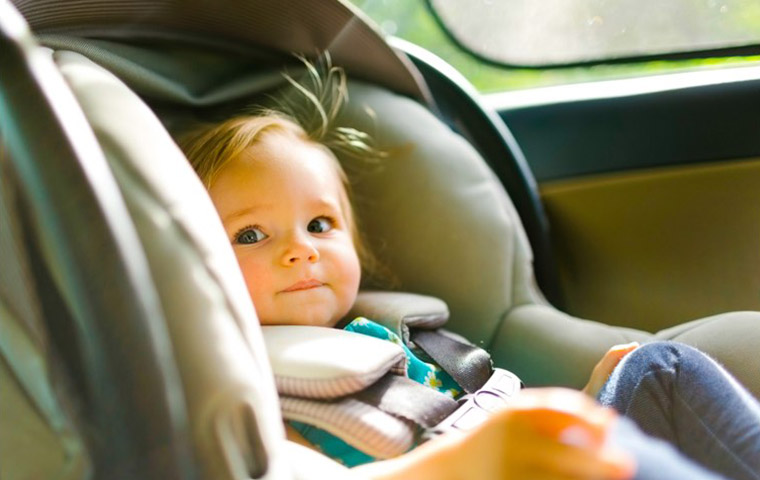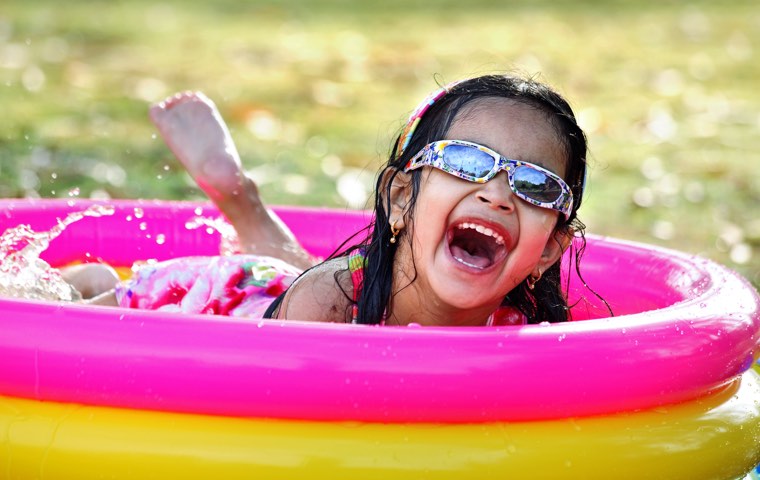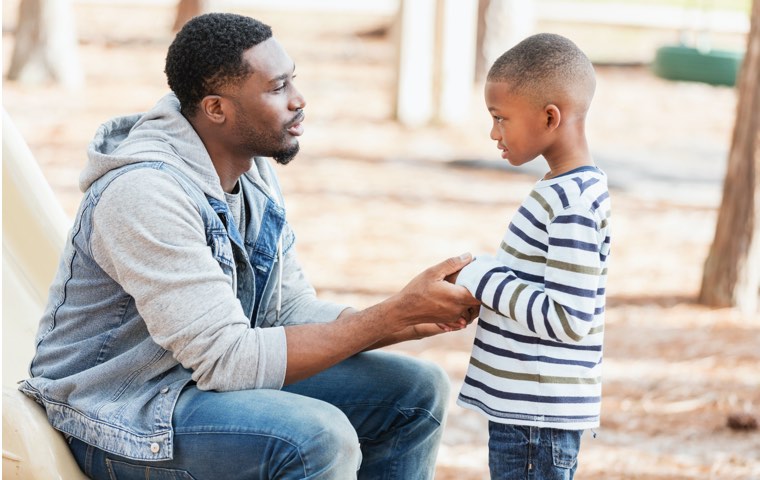Gun Safety for Kids
By Kathryn Sibley Horton
Read Time: 8 Minutes
Some families live with guns in the home and others don't. Learning proper gun safety for kids is key to keeping your children safe whether in your own home or at someone else's. Unintentional and self-inflicted gun injury is the second leading cause of death in the U.S. for children and young adults. Every year nearly 350 children and youth under 18 years of age unintentionally shoot themselves or someone else. Three out of four of those incidents happen in a home.
Be gun smart.
Store guns and ammunition away from children.
- Unload and lock guns.
- Lock up guns in a safe place.
- Lock up ammunition. Put it somewhere separate from guns.
- Make sure guns and ammunition are in places where children cannot get to them.
Use gun safety guidelines.
Families who use guns for recreation, jobs, or protection should discuss and practice safety first. Always remove guns from the home when a child has depression or expresses suicidal ideas.
Always ask before they go.
Before children visit friends or family members, ask about unlocked guns in those homes. Ask about gun safety in the same way you would ask about other safety concerns.
Educate and communicate.
Talk to your children about guns and help them understand why guns are used and their dangers.
Children are curious and can find anything. Assume children know where you store your guns and lock them up so they can't get to them.
Lock up guns safely.
The top priority for anyone who owns a gun is keeping it out of the hands of children.
In Texas, you can face criminal penalties if you leave a loaded gun where children can get their hands on it and someone is hurt or killed. Child-access prevention laws like this one have helped reduce gun violence, whether intentional or accidental.
If you are a parent with guns in the home, consider the ages of your children and make safety adjustments as they get older. What's inaccessible to a toddler may not be to a teen. Don't let your guard down as your children get older. Always use a gun lock and securely store guns where children of any age cannot get them.
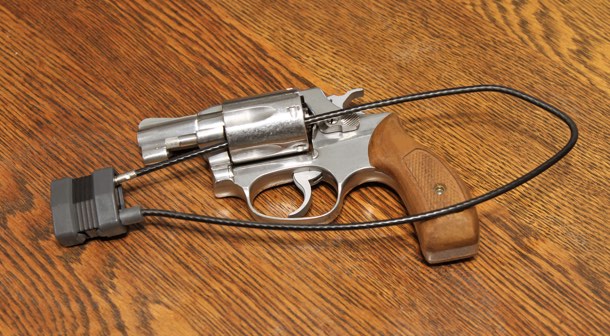
Gun locks
Locking the gun itself is an important step to gun safety for kids.
- A trigger lock fits over the gun's trigger so that the trigger cannot be pulled and the gun won't work.
- A cable-style gun lock blocks the barrel or the use of ammunition, so the gun won't work.
Project ChildSafe provides free safety kits for guns that include gun locks and instructions on how to use them.
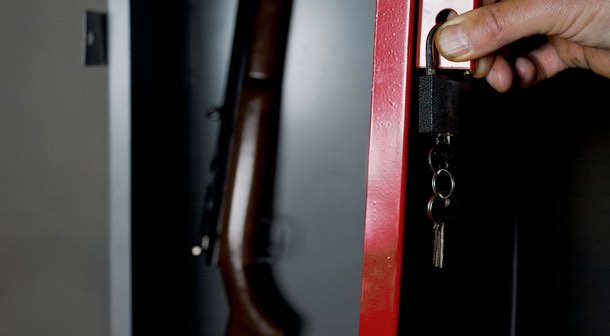
Gun storage
Having a special place to secure guns away from your children is another good way to keep kids safe. The types of storage units can vary greatly in cost. The more features the storage unit has, the more it will cost.
- Strong boxes and security cases are portable. They can provide gun safety for kids yet quick access to families who use guns for protection. You'll need to securely locate strong boxes and security cases so they can't be stolen with the gun inside.
- Locking steel gun cabinets are the next level of keeping your guns safe. They have larger storage areas and heavier construction.
- Gun safes have the most features for keeping your guns safe because of their weight, heavy-gauge steel construction, and locking mechanisms. You can even bolt a gun safe directly to your home's slab.
Lockable carrying cases and glass-front display cabinets are not reliable ways of keeping your guns safe. Carrying cases made of fabric and plastic can be stolen or damaged. Glass-front display cabinets can be broken into. Each year, about 500,000 guns are stolen in the U.S.
Never store guns in cars, in nightstands, or under mattresses. Your gun might seem easy to grab in an emergency, but that means children can also easily find the weapon.
Gun Safety Guidelines for Parents Who Use Guns
Some families use guns for sports and recreation. Others may use guns professionally with the military and in law enforcement. Many families may have guns purely for personal protection. There are many reasons guns may be in a family's home. The key is to make sure the entire family understands the dangers of guns and follows the necessary safety guidelines.
Five safety reminders for those who carry or own a gun:
- Always assume every gun is loaded.
- Always point your gun in a safe direction.
- Never point a gun at anything or anyone until you intend to shoot.
- Keep your finger off the trigger until you intend to shoot.
- Be sure of your target and aware of what is beyond it.
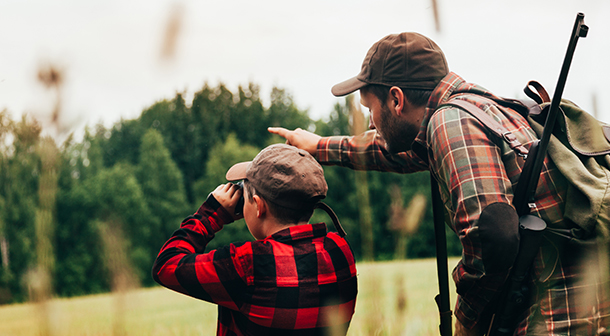
Sports and recreation.
People have been shooting for sport for many generations, and as long as it's done with a focus on everyone's safety, it can be a lot of fun. Families who use guns for activities such as hunting, trap and skeet shooting, or target practice should follow these tips for parents for gun safety for kids.
- The person using the gun should always have the gun in their possession.
- Keep the gun's safety catch in place until you are ready to shoot.
- Always unload a gun before setting it down.
- Never leave a gun unattended.
Professional use.
Parents who use guns in their profession, such as in the military and law enforcement, should immediately secure their gun when arriving home. Always store guns locked, unloaded, separate from ammunition, and in a secure place away from children.
Need parenting help now?
The Texas Parent Helpline is available 24/7.
- Call 833-680-0611
- Chat with us
- Text 833-680-0611
For protection.
Parents who own a gun for protection should never set the gun down or leave it unattended. Always safely lock guns away when not in use and follow the above guidelines.
If your child has depression or expresses suicidal ideas. immediately remove guns from your home.
Remove guns from your home during troubling periods for children with mental health concerns. You can temporarily store them in an off-site safety deposit box or in a friend's gun safe. A gun in the home can increase the risk of suicide among children and adolescents. According to the AAP, guns are the most lethal method of common suicide methods, with about a 90% mortality rate.
Pay special attention to a child who is beginning mental health treatment, whose medication is being adjusted, or who is returning home after hospitalization for a mental health or a suicide attempt. Any of these situations make the child even more vulnerable. According to the Centers for Disease Control and Prevention, 6 in 10 gun-related deaths in the United States were suicides.
A child's mental health can be affected when someone they know and love is injured or killed by gun violence.
Tips for Parents Without Guns in the Home
Your family may choose not to have a gun in the home, but that doesn't ensure that your children will never encounter one. Always ask about guns in the homes your children visit or stay at. Fewer than 1 in 3 U.S. homes follows the AAP recommendation to always store guns locked and unloaded.
Below are tips to help keep your children safe when they leave the house.
- Before your child visits the home of a friend or family member, ask the adults about guns. Find out whether they have guns in the home and if they are securely locked. Don't feel embarrassed about asking! Responsible gun owners should never be offended by questions about how guns are secured in their home.
- Teach your children what to do when they see a gun: "Stop. Don't touch. Leave the area. Tell a grownup." Practice saying it and playact the behavior.
- Talk with children about how guns are shown in movies, video games, and television shows. Guns have a strong presence in our culture. Regular conversations with children about guns can help them better understand the dangers of guns and reinforce the need for gun safety for kids.
When your child visits a friend's home, ask the parents: "Do you have guns in your home?" The answer will help you decide whether that home is safe for your child to visit.
How to Talk to Your Family about Guns and Gun Culture
As with so many other parenting challenges, communication is the key to ensuring you and your child are on the same page. Follow these tips to help create gun safety for kids depending on your child's age and emotional development.
- Demystify guns. Discuss how the media often romanticizes guns and explain how that differs from reality.
- Clarify the facts. Talk about how many people each year are injured and killed by guns. But also explain that guns are used for law enforcement, the military, hunting, certain sports, and personal protection.
- Outline our rights. Explain to children that Americans have the right to own guns.
- Nurture a healthy respect for guns. Get smart about guns. Children who are informed about guns can be safer.
- Know and teach children gun laws. Lead by example. Always practice good gun safety habits and secure gun storage.
- Keep no secrets. Give your children a safe space to talk about guns, other weapons, or any other threats to their safety.
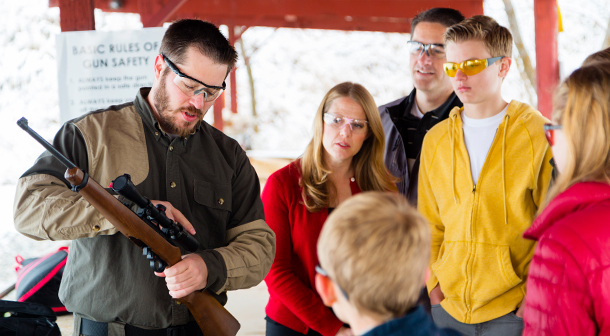
Gun Safety Tips by Age of Child
Gun Safety Tips for Parents of Kids 3–6 Years
- Be aware that many children cannot distinguish a real gun from a toy gun.
- Remember that evidence has shown that even children as young as 3 years old are strong enough to pull a trigger.
- Establish a safety routine and playact the behavior you expect of your young children if they find a gun.
Gun Safety Tips for Parents of Kids Older than 6 Years
Follow the tips for gun safety for younger children and add the following:
- Talk to children about the guns they see on TV or video games.
- Remind children that real guns are not toys and guns can kill people.
- Discuss with children what really happens when someone gets shot, being sensitive to your child's emotional ability to handle the information.
- Teach children what to do if a classmate or peer has a gun at school or elsewhere. Consult the school handbook and talk to the principal about the school's safety protocol.
Gun Safety Tips for Parents of Preteens and Teens
Follow the tips for gun safety for younger children and add the following:
- If guns are part of your family culture, teach safety while using a gun and proper storage when the gun is not in use.
- Remind preteens and teens that guns do not belong in schools or other places where they hang out.
- Create a safety plan for times when your child feels in danger, such as when visiting a home with unsecured guns or discovering a friend is carrying one. This could include leaving the area, calling parents, or using a code word if necessary.
Gun Safety Tips for Parents of Children of All Ages
- Keeping your gun safe includes two steps used together:
- Lock the gun away.
- Lock the gun itself to keep it from working if it is stored with the ammunition.
- Teach your children what to do if they find a gun: Stop. Don't touch. Leave the area. Tell a grownup.
- Don't leave guns unattended and unload a gun before you set it down or store it.
- Assume children know where you store guns and lock them up so they can't be reached.
- Remember that young children can be strong enough to pull triggers.
- Even children who have been around guns may be curious about them and try to play with them.
- Keep gun-cleaning supplies locked in a secure area - they are poisonous.
- If you decide you no longer want a gun in your home, contact your local police department for the safest way to get rid of it.
Taking these steps can help save lives and help you as a parent rest a little easier.



